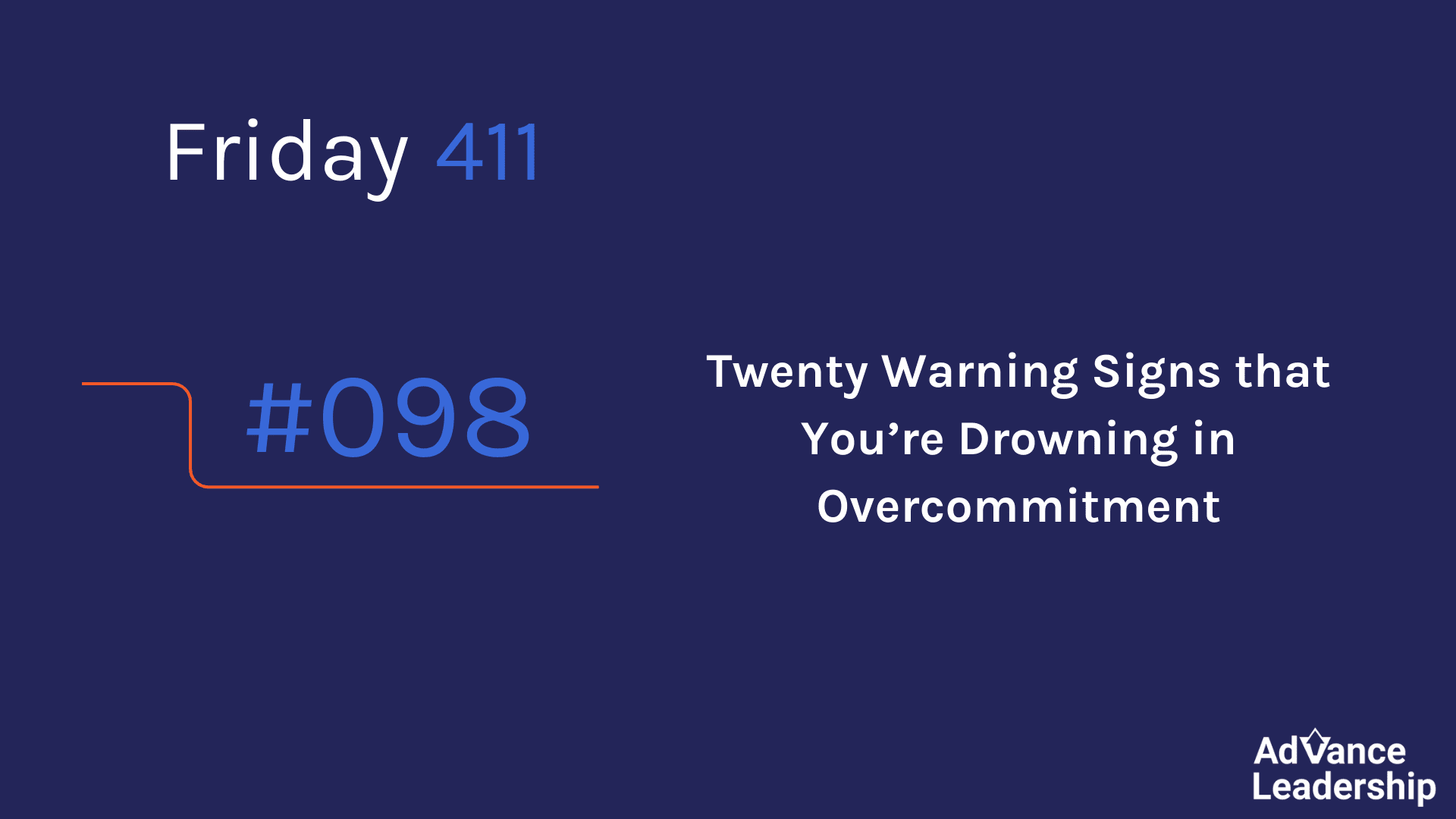Welcome to Friday 411, issue #098. In 4 minutes, with 1 insight and 1 action, you’ll evaluate if you’re too busy to lead others intentionally.
1 Action
Busyness is an overcommitment to too many good commitments. It’s draining your capacity to lead and preventing your team from reaching their biggest goals.
I’ll never forget the words my doctor said to me in 2013: “I am concerned for your life.”
At 36 years old, I described four troubling symptoms during a routine checkup:
- Exhaustion – I never felt rested, no matter how much I slept.
- Heart Palpitations – I’d sweat and struggle to breathe from simple tasks like checking email.
- Forgetfulness – Important information vanished from my mind.
- Chronic Migraines – Debilitating headaches hit me three times a week.
Dr. Tate listened intently and then asked me to describe my life.
“My life is good. Really busy.”
I rattled off a long list of commitments: working 60 hours a week, earning my doctorate, traveling frequently, raising three kids, and volunteering at my church.
“But,” I assured him, “it’s a good busy.”
He placed a hand on my shoulder, looked me in the eye, and said, “Garland, I am concerned for your life. If you don’t kill busyness, it’s going to kill you.”
Dr. Tate’s words ignited a fire in me to learn all I could about the effects of busyness. My research turned into my doctoral dissertation, which revealed a hard truth: Busyness isn’t a badge of honor; it’s a symbol of burnout.
The Toll of Busyness
Busyness is an overcommitment to too many good commitments. It’s not about doing bad things; it’s about doing so many good things that you can’t keep up with them all.
Comedian Jim Gaffigan has five children. He says, “Do you know what it’s like having five kids? Imagine you’re drowning. And someone hands you a baby.”
That’s what busyness feels like. It’s when you’re already overwhelmed by so many commitments, but you keep adding more obligations. You can barely keep your head above water.
Then someone asks you to take on one more project at work, and you say, “Hand it over. I’ll take it.”
Busyness takes massive tolls on you:
- The Physical Toll: It floods your body with stress hormones like adrenaline and cortisol, leading to exhaustion and illness.
- The Mental Toll: You can’t focus on tasks, your creativity dwindles, and your mind races endlessly.
- The Emotional Toll: You feel emotionally drained and anxious.
- The Relational Toll: Your connection with others suffers because you have no quality time.
Busyness also places a burden on your leadership:
- The Time Burden: You don’t have enough time to dedicate building a better future or to developing the people you lead.
- The Energy Burden: Leadership requires significant levels of energy, leading to exhaustion.
- The Attention Burden: You can’t focus on your most important work without distractions or interruptions.
Your busyness increases the risk of burnout, as discovered by Dr. Christina Maslach, one of the pioneers of burnout research. It also takes a massive toll on your company. A Gallup study found that burnout costs U.S. companies $322 billion annually in lost productivity.
20 Warning Signs You’re Drowning in Overcommitment
As with all problems, the first step is diagnosis. How do you know if you’re too busy? There are twenty signs:
- You feel exhausted when you wake up.
- When you’re working on a task, you can’t focus.
- When you get together with friends, you only have an hour (and check your phone repeatedly)
- You don’t have any good friends with whom you regularly spend time.
- You don’t have a way of capturing all the ideas you have.
- You don’t have any hobbies or enjoyable activities that you participate in weekly.
- When you’re tired, you use caffeine to wake you up.
- You don’t take a full day off work (including work around your house) every week.
- You don’t know what your highest priorities are each week.
- You don’t take time weekly to reflect on your accomplishments from the previous week.
- You feel exhausted when you go to bed but still feel like there’s so much you didn’t get done.
- You have overlapping meetings.
- You are late to appointments.
- You check work email/voicemail after you get home.
- You feel overwhelmed.
- You don’t have a sense of purpose to most of the activities in your life.
- When people ask you how you’re doing, you tell them you’re busy.
- You say “yes” more often than “no” when people ask you to take on a commitment.
- You frequently wonder how you’re going to “fit it all in.”
- You feel guilt or shame when you’re not productive.
If more than a few of these apply, busyness might be a serious capacity issue for you.
What to Do If You’re Too Busy
In my doctoral research, I discovered five steps to kill busyness. You start by Deciding.
Decide if busyness is worth it. Is it worth the physical, mental, emotional, and relational tolls it takes? Is it worth the burden it places on your productivity, your leadership, and your company?
We believe you will answer these questions by saying, “No! Busyness is not worth it.”
If that’s the case, congratulations! You’ve already accomplished the first step in getting (un)busy.
If you’d like a practical, step-by-step guide to move continue the journey, check out our book, Gettin’ (un)Busy: 5 Steps to Kill Busyness and Live with Purpose, Productivity, and Peace. You’ll find research-driven, ridiculously practical ways to permanently beat stress, exhaustion, and overwhelm.
1 Action
This week, complete the first step of getting (un)busy by deciding if killing busyness is important to you.

